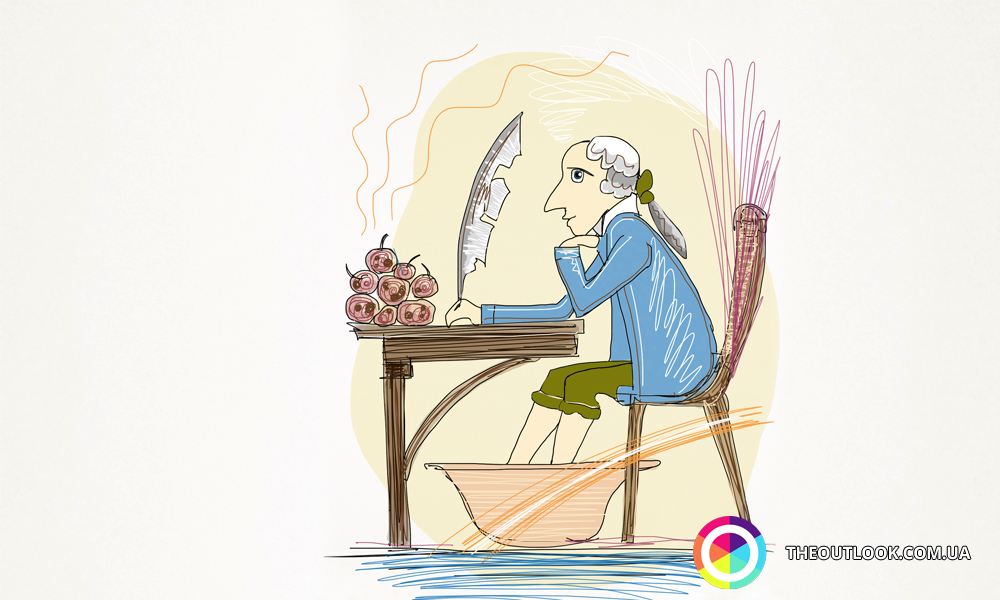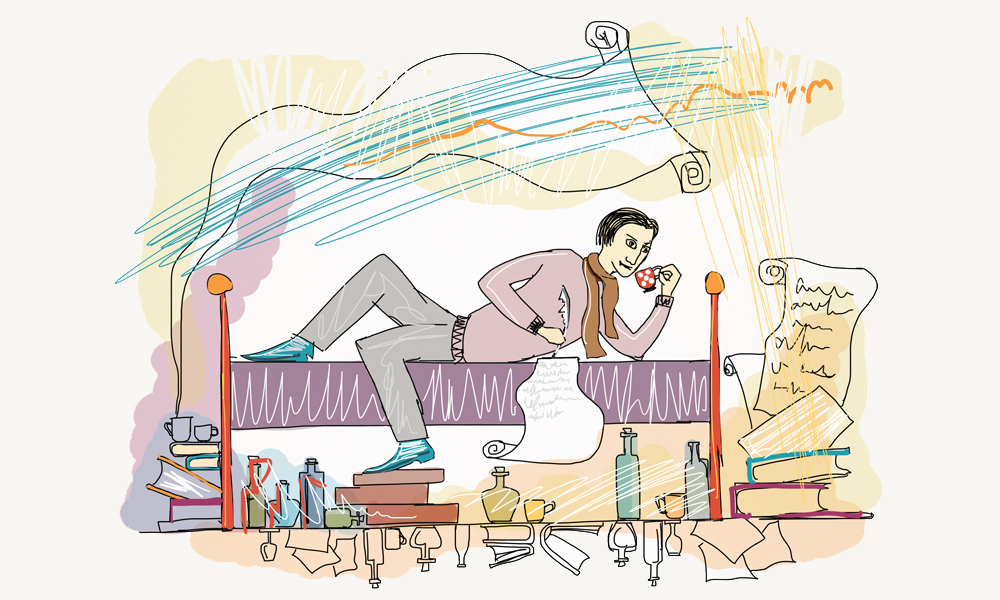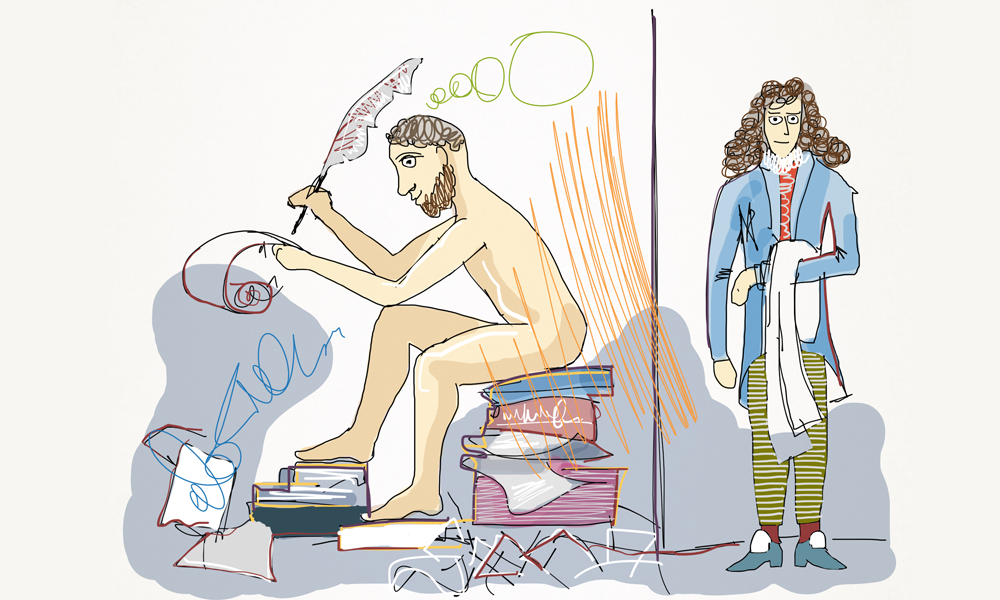Muse, descend! Inspiration recipes of great writers

Just imagine, for instance, an accountant while preparing report dips his feet into basin with cold water, and a chief makes up menu being naked… It goes without saying they would be at least considered as weird ones, and even could be sent to compulsory examination. But should some artistic people be in their places, everything may seem not so odd. Thus, what inspiration recipes were invented by famous authors?
Who knows whether students would have a chance to learn fates of Natasha Rostova and Pierre Bezukhov while reading War and Peace, but for severe winters in Russia. Those facts are connected by routines Leo Tolstoy adopted to inspire his creativity: he liked to chop some firewood and then sled to well for water. ‘But it’s beneath his aristocratic dignity…’, many of us may say thinking of his noble birth. Though, the writer did not share that opinion and never started his writing without those daily rituals.
It is well-known that many artists can hardly strive off procrastination and concentrate on craft. Apparently, that happened to Émile Zola who while working had to tie himself to a chair (not a bad idea for those constantly distracting their minds). And the zealous defender of personal freedom Friedrich Schiller could remain sitting but only with his feet dipped into a basin with cold water or ice. Yet, the most distinct writer's creative habit was to keep rotten apples on is desk. Goethe, Schiller's friend, said that once he came to visit Frederick and while waiting in his chamber, felt a sharp wave of nausea caused by the terrible stench. Goethe followed the odour to its origin which was actually inside a drawer in Schiller’s desk where Goethe found a pile of rotten fruit. He asked the servants to clean that trash, but they flatly refused since the master could not work without it.
Schiller’s love for cold was shared by the Frenchman Honoré de Balzac. While writing he used to sit at his desk with bare feet. Floors in his house were known to be very cold. Though Balzac supported heat balance of his body with vast amounts of coffee: the writer drank about 15 cups a day. So, in addition to the ink, his manuscripts were decorated with brown stains. Even more devoted fun of this beverage was the main Enlightenment philosopher of the eighteenth century (also the Frenchman, by the way) Voltaire who, especially in state of creative exacerbation, gulped down more than 50 cups of coffee a day. It is worthy of note that this creative need did not prevent him to reach a very considerable age of 83.
Author of the famous Breakfast at Tiffany’s Truman Capote also liked some cupped lightning when working. Then from morning coffee he slowly shifted to coffee with brandy, then to wine, to Martini as the day wore on ... Probably that’s why the novelist chose to write lying down, and even described himself as ‘horizontal author’.

Both members of the Dumas family were also notorious for their curious writing behaviour. Alexandre Dumas, père, had a habit of writing only on the sheets of right square shape. He immediately stopped his work if he ran out of such paper. Alexandre Dumas, fils, had very different preferences, though less unusual. Before committing his thoughts to paper, he liked to have a good meal... ‘And again nothing special’, you might say. But meal without fail had to be not less than five times. And after he had finished just a few pages, the procedure could be repeated. Therefore, it is not surprising that such custom affected his figure: Dumas, fils was quite plump. It is for better that those days they did not have McDonald's, otherwise who knows whether the famous French novelist had enough time for work having so many finger-licking foods close to him.
Female writers, though not so often known for their quirks, but still had some. Think, for instance, of Charlotte Brontë: to invite creativity she chose quite lady occupation: she loved to peel potatoes. Eventually, after hours spent over Jane Eyre, the whole company of soldiers could be easily fed with peeled vegetables.
But perhaps no one can boast of such extravagant approach to writing as again the French (oh, those French!) classic Victor Hugo. Few people are aware that the author of the famous The Hunchback of Notre-Dame wrote practically all his fiction being naked ... He ordered his valet to take all his clothes away from him and not to return before a certain number of pages was done.
 The naked wordsmith used it as some kind of self-blackmail: it ensured that he would stay home working instead of going outside, as it doesn't befit the author of serious novels to roam the Paris streets in the all together.
The naked wordsmith used it as some kind of self-blackmail: it ensured that he would stay home working instead of going outside, as it doesn't befit the author of serious novels to roam the Paris streets in the all together.
People of today, who in this sense are more prudent, can only wonder meagre imagination of great literary minds. Even if stripped to the buff, with the Internet off, telephone and television thrown away, at every place one is sure to find a lot of fascinating and all-important things that stray from real work! For instance, one can spend hours peering out the window, pondering over the migration of king penguins, re-counting the number of stripes on the wallpaper or gazing at the mirror to re-study symmetry of one’s own face. It's amazing how we find time to work in such abundance of distractions.
Illustrations by Alexandr Zadnepryanii,
specially for OUTLOOK





















